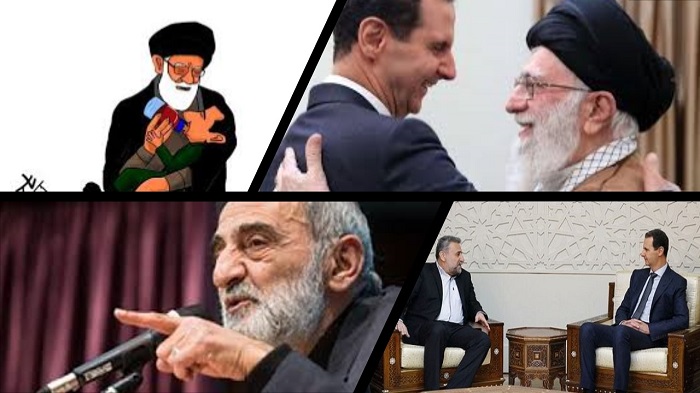
MEK Iran: Flow of arms and cash to the Assad is under the control of, Ali Khamenei.
The senior ranks of the Iranian regime have been squabbling amongst each other again. This time, it is an admission that the regime has been giving away Iranian assets that could have been used to relieve poverty in Iran rather than prop up the dictatorship in Syria headed by Bashar-al Assad.
Candid comments made by ex-chair of the National Security and Foreign Affairs Commission, Heshmatollah Falahatpisheh, have precipitated the latest stoush. Falahatpisheh gave the game away on a recent media interview when he admitted that the regime had wasted 20 billion dollars of Iranian cash away by “loaning” it to Syria.
It has already been acknowledged by some in the regime that the 20 billion was the tip of the iceberg when it comes to what Iran has lent Assad during the Syrian civil war. The Iranian Resistance movement (PMOI/MEK Iran) estimates that the true total could be anything up to 100 billion dollars of Iran’s own money. This figure comes from calculating the value of the oil, military hardware, and weapons assistance that has been flowing freely in the direction of Iran’s western near neighbor.
Khamenei himself targeted by Falahatpisheh’s remarks
What is remarkable is the fact that the flow of arms and cash to the Assad Syrian regime is under the control and direction of Iran’s Supreme Leader, Ali Khamenei. Any criticism of the payments by Falahatpisheh and others close to, or within, the ranks of the regime, are therefore directly aimed at the waning influence and power of Khamenei.
“While Mr. Falahatpisheh was a member of the National Security Commission, these kinds of non-expert comments coming from him are no surprise,” Hossein Shariatmadari, the managing editor of the conservative Keyhan media outlet wrote last Friday “but his recent remarks can hardly be attributed to his ‘lack of knowledge’ and ‘commoner’ perspective.”
Member of Iranian Parliament from Kermanshah admitted that the regime had given at least 20 to 30 billion dollars #Iranian Money to the #Syrian regime of dictator Assad to help prop it up during the civil war in that country. https://t.co/LF0BsEkF6N#Iran #MEK @USAdarFarsi pic.twitter.com/t9wgF3jtB7
— MEK Iran (Mujahedin-e Khalq) (@MEK_Iran) May 24, 2020
Sahriatmadari continued to bluster about the figures that Heshmatollah Falahatpisheh stated that had been given away to the Syrians. “It’s not clear where he got this figure from. The U.S. claims that we have spent a total of $16 billion in the entire region—which is a lie of course—and they haven’t even said that we’ve spent this amount on this or that country or given it to this or that resistance group. Now, we must ask Mr. Falahatpisheh, where have you gotten the $20-30 billion from? And what is your motive for uttering such lies against your compatriots on top of what the U.S. has said?”
Shariatmadari’s diatribe stopped short of actually accusing Falahatpisheh of aiding the regime’s enemies because he reported the payment excesses.
Gasoline price tax take could have been better spent according to Falahatpisheh
Falahatpisheh didn’t hold back in last week’s Etenmad Online interview. He pointed out that the increased tax take from the rise in gas prices, the principal cause of last November’s protests, could have been used to alleviate poverty in Iran’s regimes rather than be used to prop up repressive foreign regimes.
“Some believe that increasing the price of gasoline will increase the state’s revenue. I will also speak about what happens to the 2 trillion rials that are being taken out of the people’s pockets,” he said to Etenmad. “How many economic problems do we have in the country? The increase in gasoline prices generates 2 trillion rials per day. This is the average revenue generated by the increase in gasoline prices and selling the surplus to other countries. We can distribute this 2 trillion rial to the provinces to solve their problems. This is just part of the revenue.”
The regime had other ideas about how to spend its ill-gotten gains and the upshot was the needless deaths of 1,500 people in the aftermath of the November protests.
A spokesperson for the People’s Mojahedin Organization of Iran (PMOI/MEK Iran) said that the extra gas tax was derived from the “blood of the children of the people of Iran.” “The regime and its criminals must be punished for this crime.”
Khamenei has nowhere to hide
Falahatpisheh is hardly an innocent figure, but the fact that he has seen fit to criticize the regime’s priorities at this particular time indicates he is astutely keeping his distance from the mistakes and excesses of the troubled mullahs’ regime. Even though he has played a role in exactly the sorts of shenanigans he is now criticizing indicates he realizes the regime’s days are numbered as the tide of revolt swells within Iran.
Regime dictator Khamenei admits #Iran’s young generation wants regime changehttps://t.co/8zhXddTGQt
— People's Mojahedin Organization of Iran (PMOI/MEK) (@Mojahedineng) May 21, 2020
Khamenei, for his part, is mounting a last-ditch effort to stem the increasing opposition within Iran and consolidate his power by calling for a “young and Hezbollahi” government. Khamenei’s options are becoming fewer and fewer by the day, and as time runs out, the regime is disintegrating before the Supreme Leader’s very eyes.
